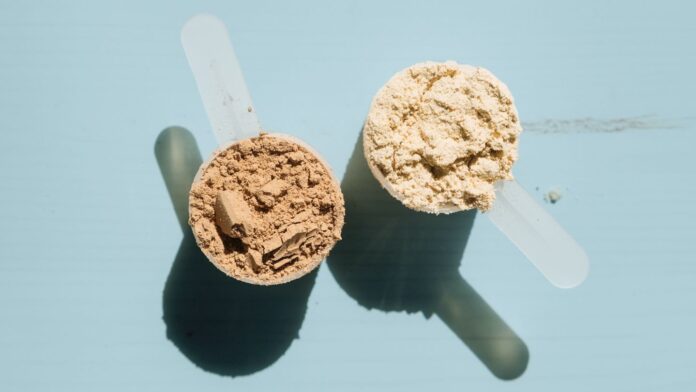The report was performed by Shopper Studies (CR), a nonprofit group staffed with each journalists and scientists that conducts impartial product testing.
Testers Checked out Dairy, Beef, and Plant-Primarily based Dietary supplements
CR investigators checked out a spread of dairy, beef, and plant-based protein dietary supplements, together with powders and ready-to-drink shakes. The group bought two to 4 a lot of every product from numerous sources, together with on-line, big-box shops, and vitamin shops.
A “lot” is a particular group of merchandise which might be produced, processed, or packaged below the identical situations.
Key findings included:
- About 70 % of examined merchandise delivered an quantity of lead per serving that was larger than CR’s each day “stage of concern,” with some exceeding that stage greater than tenfold.
- Three merchandise additionally exceeded the extent of concern for cadmium and inorganic arsenic — poisonous heavy metals categorized as possible and recognized human carcinogens (cancer-causing compounds), respectively, by the Environmental Safety Company.
- In contrast with testing from 15 years in the past, common lead ranges had been larger, and fewer merchandise had undetectable lead.
- Plant-based powders confirmed the best contamination. Two merchandise had lead ranges so excessive (1,200 to 1,600 % of the each day stage of concern) that Shopper Studies advises not utilizing them in any respect.
- On common, plant-based merchandise had 9 occasions extra lead than dairy-based ones, and twice as a lot as beef-based powders.
- Whereas dairy-based protein powders typically had the bottom ranges, about half nonetheless exceeded CR’s threshold for protected each day use.
- Vanilla-flavored powders tended to have the bottom heavy metallic ranges, whereas chocolate-flavored ones had the best.
How A lot Lead Is Too A lot?
This evaluation is a crucial reminder that there will be hint quantities of lead in protein powders, and if producers aren’t cautious about managing the amount of lead, ranges can proceed to creep up, says Pieter Cohen, MD, a complement researcher and affiliate professor at Harvard Medical College in Boston.
“That’s a critical concern, as a result of the lead can keep within the physique for months or longer,” says Dr. Cohen, who wasn’t concerned within the analysis.
The Second Regarding Report on Protein Powders in Much less Than a Yr
In contrast to they do with drugs, the FDA doesn’t approve or routinely check dietary dietary supplements earlier than they attain retailer cabinets, says Cohen. Producers are accountable for their very own security testing, and there are not any enforceable federal limits for heavy metals in protein powders. The shortage of clear, constant requirements leaves shoppers largely on their very own to guage danger, he says.
How Did Totally different Manufacturers of Protein Powder Stack Up?
Investigators put the merchandise into classes in response to the quantity of lead discovered within the powder or shake. Shopper Studies made the next suggestions:
Utterly Keep away from
- Bare Vitamin Vegan Mass Gainer
- Huel Black Version
Restrict to As soon as per Week
- Backyard of Life Sport Natural Plant-Primarily based Protein
- Momentous 100 % Plant Protein
Could Be Used Sometimes
- MuscleMeds Carnivor Mass
- Optimum Vitamin Critical Mass
- Quest Protein Shake
- Orgain Natural Plant-Primarily based Protein
- Vega Premium Sport Plant-Primarily based Protein
- Muscle Milk Professional Superior Shake
Higher Day by day Choices (Beneath the Concern Stage)
- Owyn Professional Elite Excessive Protein Shake
- Clear Labs Mass Gainer
- Optimum Vitamin Gold Commonplace 100 % Whey
- BSN Syntha-6 Protein Powder
- Momentous Whey Protein Isolate
Complement Producers Say the Report Leaves Out Necessary Context
Jeff Ventura, vp of communications for the Council for Accountable Vitamin, the main commerce group representing complement producers, says folks ought to preserve a number of issues in thoughts when deciphering the findings
“Whereas we respect that Shopper Studies has revealed some element on its methodology, we observe that vital context is lacking — particularly how merchandise had been chosen, whether or not testing mirrored typical shopper use, and the way its ‘ranges of concern’ had been derived. With out harmonization to established federal benchmarks, and even precise security danger, such proprietary thresholds can overstate danger and trigger pointless alarm,” says Ventura.
The degrees detected within the report don’t essentially add as much as a well being hazard, he says.
“The mere detection of heavy metals equivalent to lead, cadmium, or arsenic doesn’t equate to a well being hazard. Trendy testing strategies are terribly delicate and able to figuring out hint quantities of naturally occurring parts which might be discovered broadly in soil, water, and crops,” says Ventura.
What to Think about When Weighing the Advantages and Dangers of Protein Powder
Cohen agrees, saying, “I’m simply not satisfied that there are numerous widespread situations wherein folks want so as to add protein powder to the weight loss plan to be more healthy. I believe there’s rather more hype than there may be precise proof to help it.” He suggests that folks give attention to getting their protein wants met by a wholesome and balanced weight loss plan.
- Folks ages 40 and older
- Athletes, very energetic folks, or folks doing weight coaching
- Folks going by fast weight reduction, particularly from taking a GLP-1 drugs
In the event you do use protein powder, Shopper Studies recommends that you simply do the next:
- Keep away from each day use, particularly of plant-based or chocolate-flavored varieties.
- Select whey-based or collagen powders, which typically have decrease ranges of lead and cadmium.
- Verify for third-party testing or NSF certification, which point out compliance with impartial security requirements.
- Search for clear manufacturers that make heavy metallic testing outcomes public.
- Watch serving sizes. Extra powder doesn’t essentially imply extra profit.


